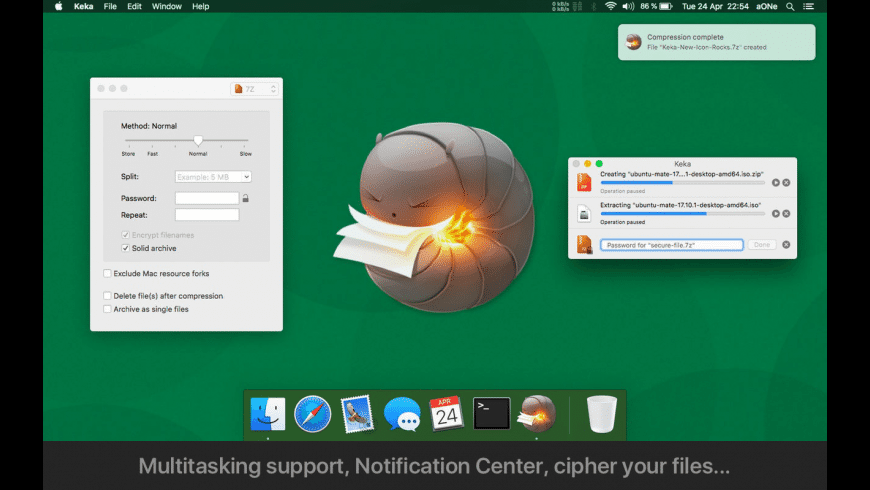Compress (bzip2) or decompress (bunzip2) files. Decompress files to stdout (bzcat) and recover data from damaged bzip2 files (bzip2recover.)
default actions: bzip2 = compress, bunzip2 = decompress, bzcat = decompress to stdout.
If no file names are given, bzip2 compresses or decompresses from standard input to standard output.
You can combine short flags, so `-v -4' means the same as -v4 or -4v
Memory Management
bzip2 compresses large files in blocks. The block size affects both the compression ratio achieved, and the amount of memory needed for compression and decompression. The flags -1 through -9 specify the block size to be 100,000 bytes through 900,000 bytes (the default) respectively. At decompression time, the block size used for compression is read from the header of the compressed file, and bunzip2 then allocates itself just enough memory to decompress the file.
Since block sizes are stored in compressed files, it follows that the flags -1 to -9 are irrelevant to and so ignored during decompression.
Compression and decompression requirements, in bytes, can be estimated as:
Winzip can zip or unzip on Mac, and open.7z file on Mac. This Winzip app on Mac support. Download The Unarchiver for macOS 10.7 or later and enjoy it on your Mac. The Unarchiver is a small and easy to use program that can unarchive many different kinds of archive files. It will open common formats such as Zip, RAR (including v5), 7-zip, Tar, Gzip and Bzip2.
Larger block sizes give rapidly diminishing marginal returns. Most of the compression comes from the first two or three hundred k of block size, a fact worth bearing in mind when using bzip2 on small machines. It is also important to appreciate that the decompression memory requirement is set at compression time by the choice of block size.
For files compressed with the default 900k block size, bunzip2 will require about 3700 kbytes to decompress. To support decompression of any file on a 4 megabyte machine, bunzip2 has an option to decompress using approximately half this amount of memory, about 2300 kbytes. Decompression speed is also halved, so you should use this option only where necessary. The relevant flag is -s.
In general, try and use the largest block size memory constraints allow, since that maximises the compression achieved. Compression and decompression speed are virtually unaffected by block size.
Another significant point applies to files which fit in a single block -- that means most files you'd encounter using a large block size. The amount of real memory touched is proportional to the size of the file, since the file is smaller than a block. For example, compressing a file 20,000 bytes long with the flag -9 will cause the compressor to allocate around 7600k of memory, but only touch 400k + 20000 * 8 = 560 kbytes of it. Similarly, the decompressor will allocate 3700k but only
touch 100k + 20000 * 4 = 180 kbytes.
Here is a table which summarises the maximum memory usage for different block sizes. Also recorded is the total compressed size for 14 files of the Calgary Text Compression Corpus totalling 3,141,622 bytes. This column gives some feel for how compression varies with block size. These figures tend to understate the advantage of larger block sizes for larger files, since the Corpus is dominated by smaller files.
Recovering data from damaged files
bzip2 compresses files in blocks, usually 900kbytes long. Each block is handled independently. If a media or transmission error causes a multi-block .bz2 file to become damaged, it might be possible to recover data from the undamaged blocks in the file.
The compressed representation of each block is delimited by a 48-bit pattern, which makes it possible to find the block boundaries with reasonable certainty. Each block also carries its own 32-bit CRC, so damaged blocks can be distinguished from undamaged ones.
bzip2recover is a simple program whose purpose is to search for blocks in .bz2 files, and write each block out into its own .bz2 file. You can then use bzip2 -t to test the integrity of the resulting files, and decompress those which are undamaged.
bzip2recover takes a single argument, the name of the damaged file, and writes a number of files 'rec00001file.bz2', 'rec00002file.bz2', etc, containing the extracted blocks. The output filenames are designed so that the use of wildcards in subsequent processing -- for example, 'bzip2 -dc rec*file.bz2 > recovered_data' -- processes the files in the correct order.
bzip2recover should be of most use dealing with large .bz2 files, as these will contain many blocks. It is clearly futile to use it on damaged single-block files, since a damaged block cannot be recovered. If you wish to minimise any potential data loss through media or transmission errors, you might consider compressing with a smaller block size.

Performance
The sorting phase of compression gathers together similar strings in the file. Because of this, files containing very long runs of repeated symbols, like 'aabaabaabaab ...' (repeated several hundred times) might compress more slowly than normal. Versions 0.9.5 and above fare much better than previous versions in this respect. The ratio between worst-case and average-case compression time is in the region of 10:1. For previous versions, this figure was more like 100:1. You can use the -vvvv option to monitor progress in great detail, if you want.
Decompression speed is unaffected by these phenomena.
bzip2 usually allocates several megabytes of memory to operate in, and then charges all over it in a fairly random fashion. This means that performance, both for compressing and decompressing, is largely determined by the speed at which your machine can service cache misses. Because of this, small changes to the code to reduce the miss rate have been observed to give disproportionately large performance improvements. I imagine bzip2 will perform best on machines with very large caches.

Caveats
I/O error messages are not as helpful as they could be. bzip2 tries hard to detect I/O errors and exit cleanly, but the details of what the problem is sometimes seem rather misleading.
This manual page pertains to version 1.0.4 of bzip2. Compressed data created by this version is entirely forwards and backwards compatible with the previous public releases, versions 0.1pl2, 0.9.0, 0.9.5, 1.0.0, 1.0.1, 1.0.2 and 1.0.3, but with the following exception: 0.9.0 and above can correctly decompress multiple concatenated compressed files. 0.1pl2 cannot do this; it will stop after decompressing just the first file in the stream.
bzip2recover versions prior to 1.0.2 used 32-bit integers to represent bit positions in compressed files, so they could not handle compressed files more than 512 megabytes long. Versions 1.0.2 and above use 64-bit ints on some platforms which support them (GNU supported targets, and Windows). To establish whether or not bzip2recover was built with such a limitation, run it without arguments. In any event you can build yourself an unlimited version if you can recompile it with MaybeUInt64 set to be an unsigned 64-bit integer.
# Zippity Doo Dah, Zippity Ay, My oh my, What a wonderful day # - Song of the South, (Disney)
Related macOS commands:


bzip.org - bzip author: Julian Seward.
gzip - Compress or decompress files.
znew(1), zcmp(1), zmore(1), zforce(1), gzexe(1), zip(1), unzip(1), compress(1), pack(1), compact(1)

Bzip2 Mac Os X
Some rights reserved